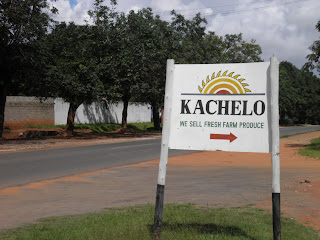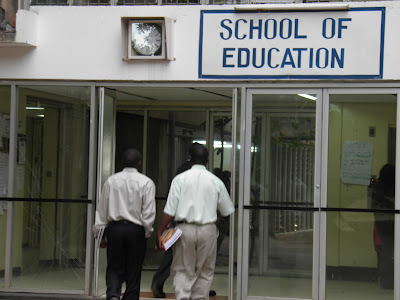To celebrate Black History Month the U.S. Embassy - brand new, up on a hill, looking imposing, frightening, embarrassing depending on your relationship with it - invited an assortment of Zambians, Americans and others from countries far and wide to a Happy Hour, photography exhibit and Jazz Band entertainment. Bill and I danced... A lovely time had by all.
Death is everyday in Zambia. The road we live on goes to a cemetery. There are daily processions of cars and trucks and buses full of singing and grieving families, colleagues, neighbors... I have been to three funerals and contributed to two others - all colleagues' family members. It seems as if every morning there is at least one University of Zambia vehicle boarding lecturers and staff to attend a funeral. It is typical for women to wear their chitenje cloth wrapped around their waists to protect from dust, dirt etc. Sitting in the back of a pickup truck can be dirty as well as bruising. The women wail and ululate during the procession to the cemetery as well as during the final viewing of the body done graveside. The grave is dug by family members or hired grave diggers. Once the body is lowered into the grave, the men and boys take turns shoveling the dirt into a high mound. Flowers, generally roses, are passed out to the mourners who then stick the stem into the mound so that is appears to be a cloth of roses draped over the grave. Following the burial there is food, singing, dancing, storytelling - all that is familiar territory. Nora came home one day from the clinic telling how a mother brought her dead child to the clinic. She didn't know what else to do. And Nora has had several other children, patients at the clinic, die from complications of AIDS. The average length of life in Zambia is falling, currently around 39 years of age.
Church liturgies for Easter are very oriented toward the northern hemisphere - new life represented by chicks, bunnies, lambs, and new growing plants. Here there is a fall tang in the early morning air, the leaves are yellow and red, dropping to the ground. Hard to experience the new life in a time of dying, repose and waiting for what new to come.
I have finished with the second semester lectures and tutorials. This week is study week and then exams consume the month of May. Those who co-lecture set exam questions which are reviewed by the other lecturers in the department. After the students write the exam, the person who set the question, grades the student response to that question. Exam papers are passed from lecturer to lecturer until the marking is complete. The course co-ordinator then compiles the composite score for each student. The Head of Department then calls all lecturers together to "moderate" the grades, i.e. make sure the scores are accurate and distribution within the School guidelines. A very different and labor intensive process from what I am used to. Looking for the internal logic...
This week I meet with Zambians accepted to study for undergraduate degrees in the U.S. I am to talk with them about what to expect in the American college/university classroom, what faculty are looking for in students etc. I know the first comment I need to make is, "please speak louder". Your instructor will not be able to hear you and you will not be heard in class discussions. Everyone here is very soft-spoken, projecting a voice to speak is not required or appreciated. I find myself having to walk up and down the one aisle in the classrooms I lecture in if I have any chance at all of hearing a question a student is posing.
Mary


















